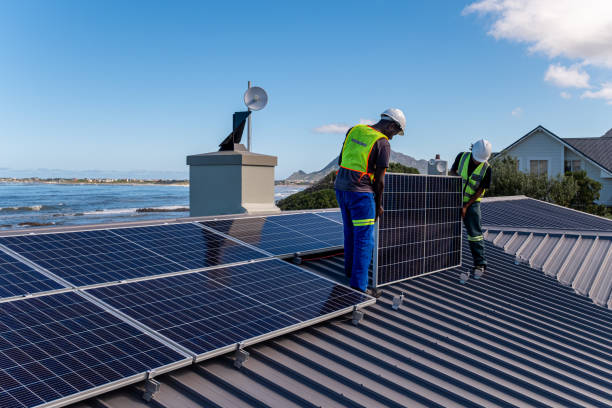
Renewable Energy
Introduction to Renewable Energy Benefits
Renewable energy, including solar, wind, and hydropower, offers numerous benefits beyond just reducing electricity bills. These benefits are particularly crucial for first responders and veterans. For example, a specific initiative provides a military discount on electricity in Texas, making it more accessible for those who have served our communities and country to transition to renewable energy. This transition not only aids in cutting operational expenses but also supports broader sustainability and resilience goals.
First responders rely on uninterrupted energy supplies to perform critical duties, and renewable energy can play a significant role in ensuring this. On the other hand, veterans can benefit from the financial relief offered by lower utility bills, promoting a more stable and secure lifestyle. Renewable energy is essential to creating a more sustainable and reliable energy infrastructure.
Energy Cost Reduction
One of the most impactful benefits of renewable energy is the substantially reduced operational costs for facilities, homes, and public services. Solar panels, for instance, have an initial installation cost, but the long-term savings they offer by reducing dependence on the grid are considerable. These savings can be reallocated to essential services, enhanced training programs, and advanced equipment for first responder facilities. Veterans, many of whom live on fixed incomes, can find financial relief through lower utility bills, allowing them to allocate their resources more effectively.
The financial benefits extend to reduced maintenance costs as well. Renewable energy systems typically require less upkeep than traditional energy sources, leading to lower long-term operational costs. This combination of immediate and long-term savings makes renewable energy an attractive option for first responders and veterans, empowering them to pursue financial stability while contributing to environmental conservation.
Energy Independence and Resilience
Energy independence is another significant benefit of adopting renewable energy. For first responders, having a reliable and self-sufficient energy source in Texas is vital to ensuring their operations continue uninterrupted, especially during emergencies and natural disasters. Distributed renewable energy systems, such as rooftop solar or localized wind turbines, reduce the risk associated with grid failures, enhancing the resilience of communities.
For example, areas with decentralized renewable energy sources experienced fewer disruptions than those reliant solely on the conventional grid. This resilience is priceless for first responders who must remain operational during crises. Similarly, veterans with mobility or health issues can benefit from the reliability of renewable energy, ensuring they have consistent access to electricity and essential services.
Renewable Energy Programs for First Responders and Veterans
Numerous programs and discounts are available to assist first responders and veterans in the transition to renewable energy. These initiatives offer financial incentives, grants, and educational resources to make the adoption of renewable energy technology more accessible. By providing targeted support, these programs help participants save on energy costs and contribute to a cleaner environment.
This guide outlines the various rebates and reduced rates available, significantly lowering the entry barrier for renewable energy adoption. By leveraging such programs, first responders and veterans can enhance their energy independence and reduce their carbon footprint.
Community and Employment Benefits
The renewable energy sector benefits individuals and has a positive impact on communities. It is a growing field that offers numerous employment opportunities, particularly for veterans transitioning back to civilian life. The skills acquired during military service, such as technical knowledge, project management, and problem-solving, are highly transferrable to the renewable energy industry. Employment in this sector provides economic benefits while allowing veterans to contribute to an environmentally beneficial cause.
Communities stand to benefit from renewable energy projects through job creation and economic growth. These projects can transform regional economies by creating a demand for skilled labor and fostering a culture of innovation and sustainability.
Environmental Impact
The positive environmental impact of renewable energy is profound. By reducing dependence on fossil fuels, renewable energy sources significantly lower greenhouse gas emissions, decrease air and water pollution and promote overall environmental health. These benefits lead to better public health outcomes and contribute to climate change mitigation, disproportionately affecting vulnerable populations.
First responders often witness the immediate impacts of natural disasters and environmental degradation. Veterans, too, may face long-term health issues related to environmental factors. By promoting and adopting renewable energy, we protect the environment and safeguard the health and well-being of those who serve and have served. This twofold benefit underscores the importance of transitioning to cleaner energy sources.
Practical Steps to Implement Renewable Energy Solutions
For first responders and veterans, the transition to renewable energy involves several practical steps. Assessing energy needs and determining the most suitable renewable options, such as solar panels, small wind turbines, or hydro systems, is crucial. This assessment clearly explains the potential energy savings and environmental benefits. Next, exploring available funding options, grants, and incentives at local, state, and federal levels is essential. Many programs offer substantial financial assistance, making renewable energy more accessible. Conducting a site assessment and consulting with renewable energy experts can provide tailored recommendations and a roadmap for successful implementation. First responders and veterans can effectively transition to renewable energy by following these steps, enhancing their energy independence, and contributing to environmental sustainability.
Conclusion: The Path Forward
Adopting renewable energy sources offers tremendous benefits for first responders and veterans, from cost savings and energy independence to environmental protection and job creation. Switching to renewable energy ensures more sustainable and resilient operations for these groups. Continued support through targeted programs and incentives will be crucial in facilitating this transition. Ultimately, embracing renewable energy allows those who serve our communities and country to do so with the backing of reliable, clean energy, fostering a healthier and more sustainable future for all.






